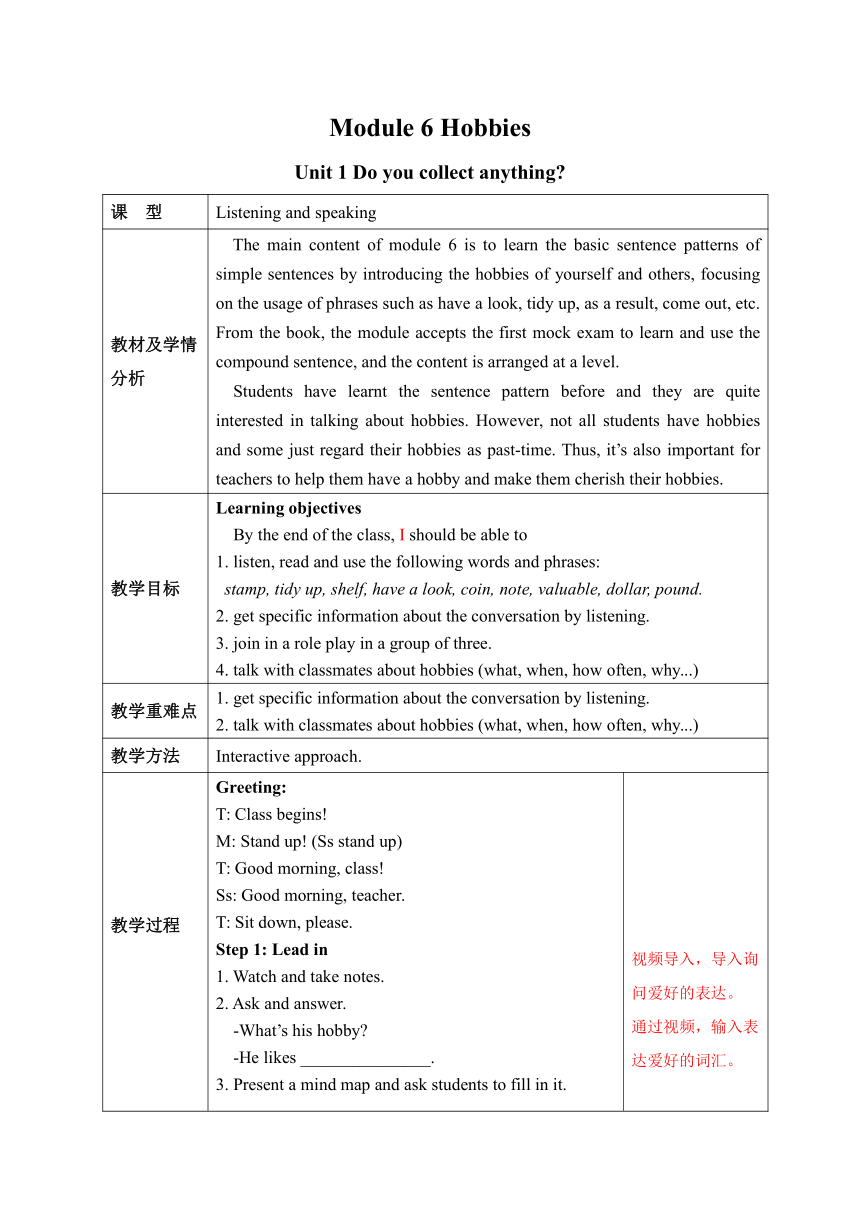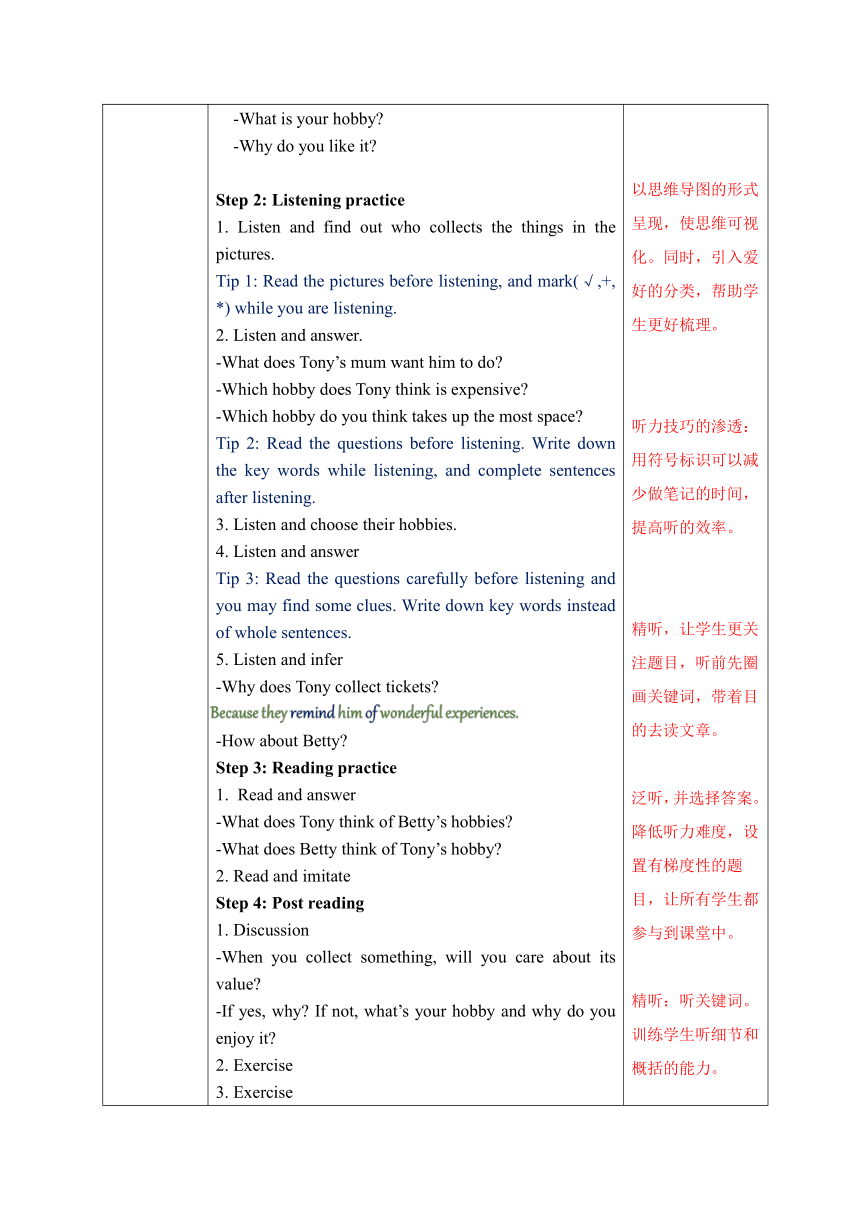外研版八下Module 6 Hobbies Unit 1 Do you collect anything ?教学设计(表格式)
文档属性
| 名称 | 外研版八下Module 6 Hobbies Unit 1 Do you collect anything ?教学设计(表格式) |

|
|
| 格式 | zip | ||
| 文件大小 | 51.0KB | ||
| 资源类型 | 教案 | ||
| 版本资源 | 外研版 | ||
| 科目 | 英语 | ||
| 更新时间 | 2022-04-16 00:00:00 | ||
图片预览


文档简介
Module 6 Hobbies
Unit 1 Do you collect anything
课 型 Listening and speaking
教材及学情分析 The main content of module 6 is to learn the basic sentence patterns of simple sentences by introducing the hobbies of yourself and others, focusing on the usage of phrases such as have a look, tidy up, as a result, come out, etc. From the book, the module accepts the first mock exam to learn and use the compound sentence, and the content is arranged at a level. Students have learnt the sentence pattern before and they are quite interested in talking about hobbies. However, not all students have hobbies and some just regard their hobbies as past-time. Thus, it’s also important for teachers to help them have a hobby and make them cherish their hobbies.
教学目标 Learning objectives By the end of the class, I should be able to 1. listen, read and use the following words and phrases: stamp, tidy up, shelf, have a look, coin, note, valuable, dollar, pound. 2. get specific information about the conversation by listening. 3. join in a role play in a group of three. 4. talk with classmates about hobbies (what, when, how often, why...)
教学重难点 1. get specific information about the conversation by listening. 2. talk with classmates about hobbies (what, when, how often, why...)
教学方法 Interactive approach.
教学过程 Greeting: T: Class begins! M: Stand up! (Ss stand up) T: Good morning, class! Ss: Good morning, teacher. T: Sit down, please. Step 1: Lead in 1. Watch and take notes. 2. Ask and answer. -What’s his hobby -He likes _______________. 3. Present a mind map and ask students to fill in it. -What is your hobby -Why do you like it Step 2: Listening practice 1. Listen and find out who collects the things in the pictures. Tip 1: Read the pictures before listening, and mark(√,+, *) while you are listening. 2. Listen and answer. -What does Tony’s mum want him to do -Which hobby does Tony think is expensive -Which hobby do you think takes up the most space Tip 2: Read the questions before listening. Write down the key words while listening, and complete sentences after listening. 3. Listen and choose their hobbies. 4. Listen and answer Tip 3: Read the questions carefully before listening and you may find some clues. Write down key words instead of whole sentences. 5. Listen and infer -Why does Tony collect tickets -How about Betty Step 3: Reading practice Read and answer -What does Tony think of Betty’s hobbies -What does Betty think of Tony’s hobby 2. Read and imitate Step 4: Post reading 1. Discussion -When you collect something, will you care about its value -If yes, why If not, what’s your hobby and why do you enjoy it 2. Exercise 3. Exercise Many people collect things, like postcards and toys. They like to put them (1) _________ special to look at. Lingling collects fans and keeps them on a (2) ________ in her bedroom. Betty collects (3) _______ and notes, such as British (4) _______ and US (5) _______. She also collects stamps from all over the world. Tony collects tickets, but Betty thinks that you cannot do anything with old tickets. Lingling thinks that people also enjoy collecting things to (6) _________ something important in their lives. Step 5: Homework 视频导入,导入询问爱好的表达。 通过视频,输入表达爱好的词汇。 以思维导图的形式呈现,使思维可视化。同时,引入爱好的分类,帮助学生更好梳理。 听力技巧的渗透: 用符号标识可以减少做笔记的时间,提高听的效率。 精听,让学生更关注题目,听前先圈画关键词,带着目的去读文章。 泛听,并选择答案。降低听力难度,设置有梯度性的题目,让所有学生都参与到课堂中。 精听:听关键词。训练学生听细节和概括的能力。 高阶思维题,训练学生逻辑推理能力和归纳能力。帮助学生更好地理解这两个角色。 阅读训练,读出“言外之意”。 模音,训练语音和语调。 结合自身进行讨论,设置情境,增加学生的情感体验。帮助学生理解hobbies的内涵,树立其正确的价值观。 在训练中巩固提升。
板书设计 Module 6 Hobbies Do you collect anything Value or notValuable things can be stored longer. …Memory is more important …
作业布置 Oral assignments: 1. Partner dialogue practice 2. Dubbing task Written work: 1. Complete book 2. Test book①②
教学反思 这节课开展不如预期。按照原本的计划,由于本课主题贴近学生生活,学生应该非常感兴趣,加上是听说课,课堂应该非常活跃。但是由于是周日第一节课,学生的精神状态不是很好,课上提醒好几次纪律,仍然有窸窸窣窣的声音。针对课堂纪律不好的情况,我有以下几点反思: 1.课堂纪律是师生双方动态合作的结果,并不全部依赖于学生听话与否。 2.进行行为管理的最终目的不在于惩罚或者羞辱学生,而在于学生能够意识到自己这个行为的不恰当之处并且知道下次该怎么做。 3. 教师精心备课,进行有效教学,让学生能全情参与到学习过程中,其实可以减少很多违反课堂纪律的行为。
Unit 1 Do you collect anything
课 型 Listening and speaking
教材及学情分析 The main content of module 6 is to learn the basic sentence patterns of simple sentences by introducing the hobbies of yourself and others, focusing on the usage of phrases such as have a look, tidy up, as a result, come out, etc. From the book, the module accepts the first mock exam to learn and use the compound sentence, and the content is arranged at a level. Students have learnt the sentence pattern before and they are quite interested in talking about hobbies. However, not all students have hobbies and some just regard their hobbies as past-time. Thus, it’s also important for teachers to help them have a hobby and make them cherish their hobbies.
教学目标 Learning objectives By the end of the class, I should be able to 1. listen, read and use the following words and phrases: stamp, tidy up, shelf, have a look, coin, note, valuable, dollar, pound. 2. get specific information about the conversation by listening. 3. join in a role play in a group of three. 4. talk with classmates about hobbies (what, when, how often, why...)
教学重难点 1. get specific information about the conversation by listening. 2. talk with classmates about hobbies (what, when, how often, why...)
教学方法 Interactive approach.
教学过程 Greeting: T: Class begins! M: Stand up! (Ss stand up) T: Good morning, class! Ss: Good morning, teacher. T: Sit down, please. Step 1: Lead in 1. Watch and take notes. 2. Ask and answer. -What’s his hobby -He likes _______________. 3. Present a mind map and ask students to fill in it. -What is your hobby -Why do you like it Step 2: Listening practice 1. Listen and find out who collects the things in the pictures. Tip 1: Read the pictures before listening, and mark(√,+, *) while you are listening. 2. Listen and answer. -What does Tony’s mum want him to do -Which hobby does Tony think is expensive -Which hobby do you think takes up the most space Tip 2: Read the questions before listening. Write down the key words while listening, and complete sentences after listening. 3. Listen and choose their hobbies. 4. Listen and answer Tip 3: Read the questions carefully before listening and you may find some clues. Write down key words instead of whole sentences. 5. Listen and infer -Why does Tony collect tickets -How about Betty Step 3: Reading practice Read and answer -What does Tony think of Betty’s hobbies -What does Betty think of Tony’s hobby 2. Read and imitate Step 4: Post reading 1. Discussion -When you collect something, will you care about its value -If yes, why If not, what’s your hobby and why do you enjoy it 2. Exercise 3. Exercise Many people collect things, like postcards and toys. They like to put them (1) _________ special to look at. Lingling collects fans and keeps them on a (2) ________ in her bedroom. Betty collects (3) _______ and notes, such as British (4) _______ and US (5) _______. She also collects stamps from all over the world. Tony collects tickets, but Betty thinks that you cannot do anything with old tickets. Lingling thinks that people also enjoy collecting things to (6) _________ something important in their lives. Step 5: Homework 视频导入,导入询问爱好的表达。 通过视频,输入表达爱好的词汇。 以思维导图的形式呈现,使思维可视化。同时,引入爱好的分类,帮助学生更好梳理。 听力技巧的渗透: 用符号标识可以减少做笔记的时间,提高听的效率。 精听,让学生更关注题目,听前先圈画关键词,带着目的去读文章。 泛听,并选择答案。降低听力难度,设置有梯度性的题目,让所有学生都参与到课堂中。 精听:听关键词。训练学生听细节和概括的能力。 高阶思维题,训练学生逻辑推理能力和归纳能力。帮助学生更好地理解这两个角色。 阅读训练,读出“言外之意”。 模音,训练语音和语调。 结合自身进行讨论,设置情境,增加学生的情感体验。帮助学生理解hobbies的内涵,树立其正确的价值观。 在训练中巩固提升。
板书设计 Module 6 Hobbies Do you collect anything Value or notValuable things can be stored longer. …Memory is more important …
作业布置 Oral assignments: 1. Partner dialogue practice 2. Dubbing task Written work: 1. Complete book 2. Test book①②
教学反思 这节课开展不如预期。按照原本的计划,由于本课主题贴近学生生活,学生应该非常感兴趣,加上是听说课,课堂应该非常活跃。但是由于是周日第一节课,学生的精神状态不是很好,课上提醒好几次纪律,仍然有窸窸窣窣的声音。针对课堂纪律不好的情况,我有以下几点反思: 1.课堂纪律是师生双方动态合作的结果,并不全部依赖于学生听话与否。 2.进行行为管理的最终目的不在于惩罚或者羞辱学生,而在于学生能够意识到自己这个行为的不恰当之处并且知道下次该怎么做。 3. 教师精心备课,进行有效教学,让学生能全情参与到学习过程中,其实可以减少很多违反课堂纪律的行为。
同课章节目录
- Module 1 Feelings and impressions
- Unit 1 It smells delicious.
- Unit 2 I feel nervous when I speak Chinese .
- Unit 3 Language in use
- Module 2 Experiences
- Unit 1 I've also entered lots of speaking competi
- Unit 2 They have seen the Pyramids.
- Unit 3 Language in use
- Module 3 Journey to space
- Unit 1 Has it arrived yet?
- Unit 2 We have not found life on any other planet
- Unit 3 Language in use
- Module 4 Seeing the docto
- Unit 1 I haven't done much exercise since I got m
- Unit 2 We have played football for a year now
- Unit 3 Language in use
- Module 5 Cartoons
- Unit 1 It's time to watch a cartoon.
- Unit 2 Tintin has been popular for over eighty yea
- Unit 3 Language in use
- Revision module A
- Module 6 Hobbies
- Unit 1 Do you collect anything ?
- Unit 2 Hobbies can make you grow as a person.
- Unit 3 Language in use
- Module 7 Summer in Los Angeles
- Unit 1 Please write to me and send me some photos
- Unit 2 Fill out a form and come to learn English
- Unit 3 Language in use
- Module 8 Time off
- Unit 1 I can hardly believe we are in the city ce
- Unit 2 We thought somebody was moving about
- Unit 3 Language in use
- Module 9 Friendship
- Unit 1 Could I ask if you've mentioned this to he
- Unit 2 I believe that the world is what you think
- Unit 3 Language in use
- Module 10 On the radio
- Unit 1 I hope that you can join us one day
- Unit 2 It seemed that they were speaking to me in
- Unit 3 Language in use
- Revision module B
